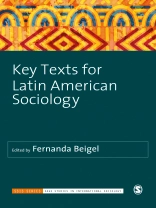Key Texts for Latin American Sociology is the first book to curate and translate into English key texts from the Latin American Sociological canon. By bringing together texts from leading sociologists in Argentina, Brazil, Peru, Chile, Costa Rica, Mexico, Bolivia, and Uruguay, the book provides comprehensive coverage of a wide range of issues in Latin American Sociology; drawing attention to embedded issues such as inequalities, identities, development, oppression and representation.
This volume is the result of five years of collaboration between colleagues from 15 Latin American Countries, coordinated by Fernanda Beigel (CONICET, UNCuyo, Mendoza-Argentina) with the collaboration of the ′Key Texts Scientific Committee′, the Committee consists of the following members: Nadya Araujo Guimaraes (PPGS-USP, Brazil), Manuel Antonio Garretón (Universidad de Chile), Raquel Sosa Elizaga (CELA-UNAM, México), Jorge Rovira Mas (Universidad de Costa Rica), Breno Bringel (IESP-UERJ, Brazil), Joao Ehlert Maia (FGV, Brazil), Hebe Vessuri (IVIC, Venezuela), André Bothelo (UFRJ, Brazil), Carlos Ruiz Encina (Universidad de Chile), Eloisa Martin (UFRJ, Brazil), Sergio Miceli (PPGS- USP, Brazil), Alejandro Moreano (UCE, Ecuador), Elizabeth Jelin (CONICET-IDES, Argentina), Patricia Funes (UBA-CONICET, Argentina), Claudio Pinheiro (FGV, Brazil), Pablo de Marinis (UBA, CONICET, Argentina), Diego Pereyra (UBA, CONICET, Argentina), José Gandarilla Salgado (CIICH-UNAM, México), Juan Piovani (UNLP-CONICET, Argentina).
Table des matières
INTRODUCTORY STUDY – Latin American Sociology: a centennial regional tradition, by Fernanda Beigel (Argentina)
PART ONE : FOUNDING PROBLEMS
Chapter 1: Founding problems and institutionalization of Sociology in Latin America, by Jorge Rovira-Mas (Costa Rica)
Chapter 2: Alberto Guerreiro Ramos (Brazil)A Critical Introduction to Brazilian Sociology: Canned Sociology versus Dynamic Sociology . Commentby Joao Maia Elhert (Brazil)
Chapter 3: Orlando Fals Borda (Colombia) Theoretical-Practical Experiences: General Working Guidelines on Participatory Action Research (PAR). Comment by Juan Piovani (Argentina).
Chapter 4: Aníbal Quijano (Peru) Of Don Quixote and Windmills in Latin America, Comment by Claudio Pinheiro (Brazil)
Chapter 5: Edelberto Torres Rivas (Guatemala-Costa Rica) On the Pessimism in the Social Sciences. Comment by Sergio Villena-Fiengo (Costa Rica)
Chapter 6: Elizabeth Jelin (Argentina) The foundations of a new issue: Gender, human rights and memory. Comment by Teresa Valdés Echenique (Chile)
PART TWO : HISTORICAL AND CONTEMPORARY DEBATES
Chapter 7: Understanding historical and contemporary debate in Latin American Sociology: Enlightening paths by Raquel Sosa Elízaga (Mexico)
Chapter 8: Sergio Bagu (Argentina-Mexico) Building theory. Comment by Pablo de Marinis (Argentina)
Chapter 9: René Zavaleta (Bolivia) The struggle for the surplus. Comment by Oscar Vega Camacho (Bolivia)
Chapter 10: Arturo Escobar (Colombia). Development (Again) in Question: Trends in Critical Debates on Capitalism, Development and Modernity in Latin America. Comment by Irene Piedrahíta Arcila (Colombia)
Chapter 11: Bolívar Echeverría (Ecuador-Mexico) The ′American′ Modernity. (Keys to its Understanding). Comment by Márgara Millán (Mexico)
PART THREE : SOCIAL STRUCTURE AND INEQUALITIES
Chapter 12: Inequality, Inequalities by Nadya Araujo Guimaraes (Brazil)
Chapter 13: José Carlos Mariátegui (Peru) The problem of race: Approaching the Issue. Comment by José Carlos Mariátegui-Ezeta and Javier Mariátegui Chiappe (Peru).
Chapter 14: Florestan Fernandes (Brazil) The Weight of the Past . Comment by Antonio Sergio Guimaraes (Brazil).
Chapter 15: Rodolfo Stavenhagen (Mexico) The dynamics of Inter-ethnic relations: Classes, colonialism and acculturation. Comment by Francisco Zapata (Mexico)
Chapter 16: José Nun (Argentina) Marginality and Social Exclusion (Fragments). Comment by Gabriel Kessler (Argentina)
Chapter 17: Marina Ariza and Orlandina de Oliveira (Mexico) Households, families and social inequalities in Latin America. Comment by Brigida García (Mexico)
PART FOUR : IDENTITIES, ACTORS AND SOCIAL MOVEMENTS
Chapter 18: Latin American Perspectives on Social Movements Research by Breno Bringel (Brazil)
Chapter 19: Silvia Rivera Cusicanqui (Bolivia) Ch’ixinakax utxiwa. A Reflection on the Practices and Discourses of Decolonization. Comment by Maristella Svampa (Argentina)
Chapter 20: Eder Sader (Brazil) New Players Came on Stage – São Paulo Workers’ Experiences, Language, and Struggles (1970?1980). Comment by Maria da Gloria Gohn (Brazil).
Chapter 21: Virginia Vargas (Peru) Latin American feminisms and their transition to the new millennium (a personal political reading). Comment by Susana Rostignol (Uruguay)
Chapter 22: Enrique de la Garza Toledo (Mexico) Trade union models in Latin America, before and after. Comment by Patricia Collado (Argentina)
SECTION FIVE : STATE, SOCIETY AND POLITICS
Chapter 23: Politics, state and society in Latin American sociology: A partial introduction by Manuel Antonio Garretón (Chile)
Chapter 24: Suzy Castor (Haiti) The secular roots of a difficult nation-building. Comment by Patricia Funes (Argentina)
Chapter 25: Ernesto Laclau (Argentina-UK) The populist turn and the center-left in latin america. Comment by Paula Biglieri (Argentina)
Chapter 26: Guillermo O’Donnell (Argentina-US) On certain aspects of the crisis of State. Comment by Maria Hermínia Tavares de Almeida (Brazil)
Chapter 27: Bernardo Sorj (Brazil) Political activism in the era of the internet. Comment by Carlos Ruiz Encina (Chile)












